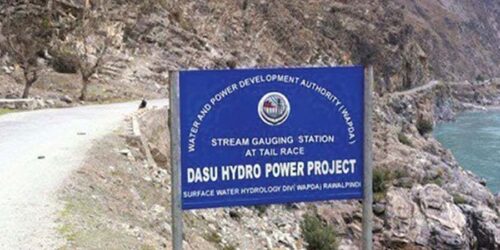Following the subversive activity by anti-CPEC forces on July 14, Wapda has provided the signature of Pakistan’s regular Army at the Dasu Hydropower project’s site and upgraded its security apparatus up to the satisfaction of Chinese government, but even after almost two months, China’s Gezhouba Group Corporation (CGGC) has not started construction work, which is questionable.
Gezhouba also suspended its construction work at Mohmand Dam site for 10-12 days. However, the work on Mohmand Dam was then set in motion but on Dasu it is still suspended. The one-day delay translates into deferment of 21 more days in restarting the project activities owing to which the overrun cost also increases manifold.
Lt Gen Muzammil Hussain (retd), after being appointed as chairman of Wapda for another tenure, flagged the issue of suspension of construction activities at Dasu while talking to The News in a wide-ranging interview.
Gezhouba hasn’t started work on Dasu, based on its new ‘illogical’ assertions over some commercial and contractual issues, knowing the fact that these cannot be clubbed with the security issues.
There is a dispute settlement forum, which is the right platform to resolve such issues as per the agreement. But the company is insisting to resolve the said issues from the provisions of the contractual and commercial agreements.
“We held nine meetings to this effect and worked out that the Pakistan side’s version on the commercial and contractual issues raised by the Chinese company was right and, to this effect, the World Bank Mission is also at the site to know as to why the work was still suspended. The World Bank has committed $700 million loan for the project,” he said.
“Wapda will not hesitate to impose the LDs (liquidated damages) on China’s Ghezouba on further delays in the light of WB’s mission’s report.” He said that the suspension of work was not justified by claiming force majeure, linking it with security cover.
He said that the Government of Pakistan has provided security cover of regular Pakistan Army and, to this effect, a full brigade has been moved from Mangla. Wapda has also upgraded its own security apparatus making China fully satisfied, but China’s Ghezouba is not inclined to start work on the project, which is highly worrying.
Coming to financing of the mega Diamer-Bhasha Dam and Mohmand Dam hydropower projects, the chairman said that Wapda has committed to have $2.23 billion from international market lenders. And out of $2.23 billion, Wapda will get the amount in dollars in staggered form. To this effect, Wapda has managed the first tranche of $500 million at interest rate of 7.5 percent through the green Euro Bond, also named as Indus Bond. It was May 27 when the first green Eurobond in the international capital market was floated and enlisted at the London Stock Exchange.
He said once the two phases of Dasu project are completed, it will generate 21 billion units a year with four billion units more than the electricity generation by Diamer-Bhasha Dam having capacity to produce 18 billion units. He said the Neelum-Jehlum hydropower can generate over 5 billion electricity units a year.
He said that in a country like Pakistan, the engineering capacity has eroded manifold and there was no consultant at the country level available for the mega project, which is why for every project,Wapda has to seek foreign firms. He said that the hydro sector has been neglected for the last 30-40 years. Although, some provinces focus on small dams and small hydel projects, these all cannot help resolve the challenges keeping in view the scale of the economy.
He mentioned that the Indus Cascade with the drop of 7,030 feet, starting from Shyok to Kalabagh site, has identified 12 sites for hydro generation potential of 40,000 MWs whereas the Indus Basin has a total potential of hydro generation of 100,000 MWs.
He said Wapda, apart from Diamer Bhasha, Dasu and Mohmand dams, is also working on nine hydro projects. He also disclosed that Wapda has also initiated work on the Kurram Tangi project.
There are almost 1,200 provincial and federal laws which help retard the development of mega projects and on top of that PPRA rules and NAB fears also prevent authorities from taking on-time decisions.
He said that the mega projects involve long gestation, huge utilization of capital and mammoth settlement issues. And if the smooth sailing is ensured, then Diamer Bhasha Dam will be completed and commissioned by December 2028. He said that Mohmand Dam will be able to store the flood water in 2025-26 and by the end of 2025, its first unit will be operational for hydro generation.
However, the dam will be able to generate 800 MW of electricity through its four units to be fully operational by the end of financial year 2025-26. Talking about the circular debt, which has swelled to over Rs2.2 trillion, he said CPPA (Central Power Purchase Agency) owes Wapda Rs200 billion, which is why it is facing a liquidity crisis. The Wapda chairman said net hydel profit is the constitutional right of the provinces and under the latest scenario, a forum like ECC has endorsed that the CCPA will in future pay the NHP to provinces, KP and Punjab, as it collects the bills embedded with the cost of NHP in the tariff. And to this effect, Finance Minister Shaukat Tareen has been kind to bail out Wapda from the issue of paying NHP. In the past, Wapda has borrowed a lot from commercial banks to pay the NHP.
He also mentioned the EAD gets the loans at 3-4 percent and re-lends them to Wapda and other state-owned companies at 15 percent, which is why the projects’ cost increases a lot. He said that with the intervention of the finance minister, the relending rate has been brought down to 12 percent, which is still on the higher side.







